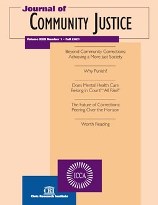Complete Issue
Author: Donald G. Evans.
Source: Volume 23, Number 01, Fall 2013 , pp.1-24(24)

< previous article |return to table of contents
Abstract:
This issue of JCC includes four interesting articles: a follow-up research article, a challenging speech, a practical approach to reaching beyond our borders, and a selection of book reviews worthy of our attention.Elizabeth E. Mustaine, University of Central Florida, and Richard Tewksbury, University of Louisville, present their findings from an eight-year follow-up of Tewksbury and Higgins’s article “What Can Be Learned From an Online Sex Offender Registry Site?” published in JCC in 2005 (vol. 14, no. 3). Their findings indicate that registries have expanded in scope in terms of the amount of information available on offenders and that the methods of searching information about sex offenders have improved and been enhanced. The authors discuss the policy implications of their research. Dr. John Gannon, executive director of the International Association for Correctional and Forensic Psychology, was the speaker at the Edwin I. Megargee Honorary Lecture during the International Community Corrections Association Conference in Reno, Nevada, September, 9–12, 2013. In his provocative speech, Gannon presented a range of ideas and concepts that provided considerable fodder for practitioners to mull over and digest. Dr. Gannon discusses forces that block remediation and a reading of evidence-based practice that may be controversial (the evidence rules out what doesn’t work rather than rules in what works). He reviews the current debates and dialogues and uses Kuhn’s scientific revolution thesis to shed light on these debates—and in some cases disagreements—between various schools of correctional thought. Dr. Gannon also addresses folk criminology and the folk practitioner and what can be learned if we pay attention to the evidence. R.E. Brown, a former parole manager with the Correctional Services of Canada and a member of ICCA, writes about efforts to assist and work with African correctional colleagues. This article centers on efforts ongoing in South Sudan. Brown’s approach is to find concrete and practical ways to engage Western correctional practitioners with African correctional workers. He builds his argument by demonstrating how the sharing of criminal justice books with the correctional libraries in Africa can assist in making both the staff and the systems in Africa more efficient. Book review editor Russ Immarigeon has assembled a selection of recent books worth exploration, including two books by Bruce Jackson on conditions in American prisons. Jackson’s approach is not likely to be available to future documentary researchers due to restrictions on media access that are now more the rule than the exception in our prison systems. Immarigeon’s review of Cullen and Gilbert’s reissue of Reaffirming Rehabilitation (30th Anniversary Edition) reminds us of the strong theoretical and conceptual base to the expanding empirical research on evidence-informed practice.It is also a good historical reference for those interested in pursuing a new penology rooted in the rehabilitative ideal but which is more effective, accountable, and professional. Other reviews cover current topics such as desistance, restorative justice, and probation.Keywords: prison alternatives; sex offender registries; evidence-based practice; correctional psychology
Affiliations:
1: Journal Editor.